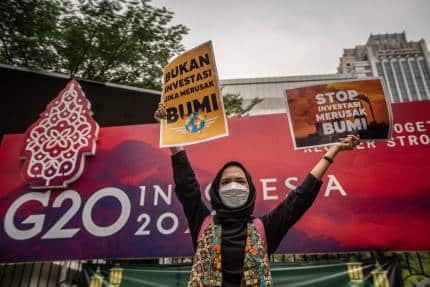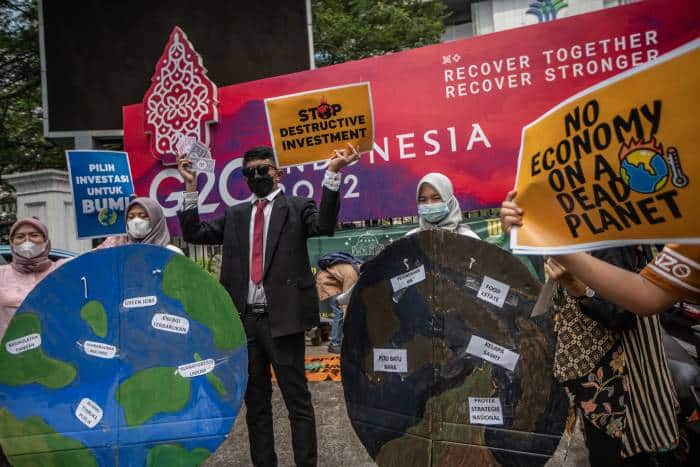
Coinciding with the United Nations climate talks in Sharm El Sheikh, Egypt this week is another crucial summit taking place in Bali, Indonesia between the leaders of the G20 nations, the world’s economic powerhouses.

Youth from Climate Rangers and 350 org held an action in front of the Ministry of Investment Office in Jakarta to commemorate the Earth Day on 22 April 2022. They urged the government to stop funding bad investments for the earth, and choose green investments in Indonesia.
The members of the G20 are: Argentina, Australia, Brazil, Canada, China, France, Germany, India, Indonesia, Italy, South Korea, Japan, Mexico, Russia, Saudi Arabia, South Africa, Turkey, the United Kingdom, the United States, and the European Union.
These member countries account for nearly 2/3 of the global population, 85% of the world’s economic output and 75% of world trade. They are also known for being the most responsible for the climate crisis, not to mention funneling over US $3.3 trillion into the fossil fuel industry between 2015 and 2021. We know that these countries’ carbon emissions make up 75% of the global total. G20 countries also enable disastrous fossil fuel projects such as the East African Crude Oil Pipeline (EACOP) in Africa, the Matarbari coal plant in Bangladesh, and Java 9 and 10 in Indonesia.
The climate crisis is a lived reality everywhere in Asia. If left unabated, it will continue to cause irreversible damage to the ecosystems, economy and the well-being of our societies.
Shifting to a low-carbon economy is a matter of great concern because it entails changing the development pathway of our countries to ensure our capacity not only to survive, but to thrive, in the context of the climate crisis.
The G20 plays a special role in this because according to this year’s Climate Transparency Report, its member countries are undermining climate efforts, and fossil fuel production subsidies continued to surge to the highest levels ever in 2021.
This summit should be able to deliver on vision, leadership, and ambition that translates into concrete steps for G20 member countries to step up their 2030 climate targets enshrined in the Paris Agreement so we don’t breach the 1.5ºC warming limit.
Massive financial stimulus is needed to jumpstart the just energy transition, which should focus on funding developing countries, clearly prioritizing grants over loans to avert, minimize, and address loss and damage associated with the adverse impacts of climate change.
What you can do now
Support our work by signing our petition calling on the G20 leaders to stop promoting false solutions to the climate crisis and start the just energy transition now:
The post G20 and its role in the much-needed transition to a low-carbon world appeared first on 350.


0 Commentaires